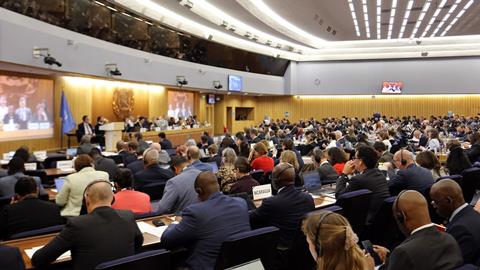Marine Environment Protection Committee (MEPC 83) concluded with draft regulations that will set mandatory marine fuel standard and GHG emissions pricing for shipping, a first for the sector.

The International Maritime Organization (IMO) said that the Net-Zero Framework is the first in the world to combine mandatory emissions limits and GHG pricing across an entire industry sector.
These measures, approved during MEPC 83 that took place in London on April 7-11, are set to be formally adopted in October 2025 before entering into force in 2027. The rules are applicable for oceangoing ships over 5,000 gross tonnes.
The framework will be included in a new Chapter 5 of Annex VI (Prevention of air pollution from ships) to the International Convention for the Prevention of Pollution from Ships (MARPOL). MARPOL Annex VI currently has 108 Parties, covering 97 percent of the world’s merchant shipping fleet by tonnage, and already includes mandatory energy efficiency requirements for ships.
Under the draft regulations, ships will be required to comply with a global fuel standard, whereby ships must reduce, over time, their annual greenhouse gas fuel intensity (GFI). Ships emitting above GFI thresholds will have to acquire remedial units to balance its deficit emissions, while those using zero or near-zero GHG technologies will be eligible for financial rewards.
The IMO said that there will be two levels of compliance with GHG fuel intensity targets: a base target and a direct compliance target at which ships would be eligible to earn ‘surplus units’. Ships that emit above the set thresholds can balance their emissions deficit by tansferring surplus units from other ships, using surplus units they have already banked, or by using remedial units acquired through contributions to the IMO Net-Zero Fund.
That fund will collect pricing contributions from emissions and monies raised will be used to: reward low-emission ships; support innovation, research, infrastructure and just transition initiatives in developing countries; fund training, technology transfer and capacity building to support the IMO GHG strategy; and mitigate negative impacts on vulnerable states.
















